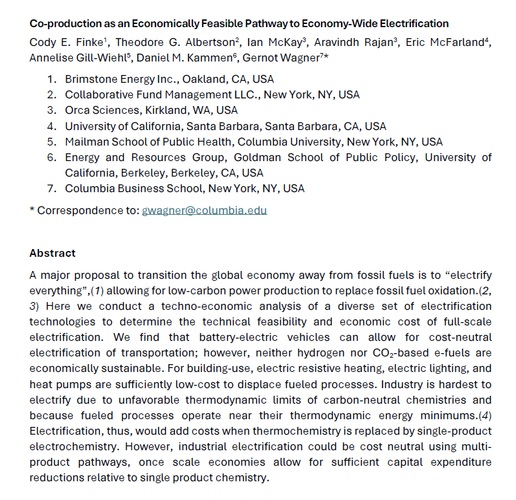The New European: "Earth’s last rays of hope?"
By Clár Ní Chonghaile

“My biggest fear is that we slither into solar geoengineering unwittingly, without having done the hard work, and that could play out in various different ways,” said Gernot Wagner, a climate economist at Columbia Business School and author of Geoengineering: the Gamble. “One scenario might be basically to not do the research … and then somebody somewhere is going to pull the trigger… Say we have yet another heat storm above a subcontinent of a billion people – like we literally had these past weeks with a tenth of humanity … What else would it take? Would it take two-tenths of humanity? Does it have to affect India and China?”
Despite all these fears, Wagner says the idea that you can quash all future research is just wishful thinking. “Yes, solar geoengineering is a scary technology …It’s not something to joke about or take lightly, but none of that means we shouldn’t be doing the research,” he says.
“It’s about weighing the risks of unmitigated climate change – the world we are heading towards – against the risks of a world that also considers solar geoengineering.”
Last year, the world’s leading solar geoengineering research unit at Harvard University had to cancel an outdoor test of the grandly named Stratospheric Controlled Perturbation Experiment, or SCoPEx, in Sweden because of opposition from leaders of the indigenous Saami people, who live in the area. The plan was to fly a balloon high into the sky, but without releasing any particles this time.
Wagner, who was the founding executive director of Harvard’s Solar Geoengineering Research Programme, says the experiment would have had no direct environmental impact.
Even if they had released sulphur dioxide, he says the direct impact would have been less than that caused by a commercial airliner during one minute of flight. “Which is another way of saying that none of this was ever about the environmental impact. It’s about the symbolism.”
The new body will try to determine what information is needed to take rigorous and science-based decisions on whether to deploy such technologies, said Adrien Abécassis, executive director of policy at the Paris Peace Forum, which will host the commission.
“They will not be looking for some kind of Plan B, or emergency solution, or emergency brake. That’s not the point. The question is: have we really considered all the possible combinations of options? It’s a kind of moral duty to be sure we do all we can to minimise the risks,” Abécassis said.
The commission stresses that harmful emissions still need to be cut. Wagner agrees and believes tech must be part of the solution.
“It’s like teaching your six-year-old to turn off the water while she brushes her teeth – because it’s the right thing to do. Acting immorally is bad. Do the right thing, but believing that behavioural change alone is going to fix (climate change)? No. How do you decarbonise your apartment? With new technology, with good insulation, triple-glazed windows, heat pump, solar pump, battery storage, the induction stove – all these elements are fantastic new tech for behavioural change.”
Quoted in: "Earth’s last rays of hope?" by Clár Ní Chonghaile in The New European (2 June 2022).


